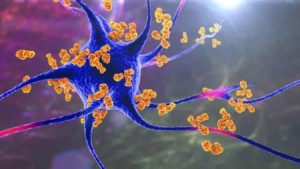Neuroscientific is researching a potential cure for post-COVID lung damage

While coronavirus vaccines may soon ease the danger of the pandemic, Neuroscientific is investigating a possible treatment for a consequence of COVID-19. Image: Getty
Special Report: While coronavirus vaccines may soon ease the danger of the pandemic, a burgeoning Western Australian company is investigating a possible treatment for a consequence of COVID-19 that may be with us for decades.
As many as a third of COVID-19 survivors are estimated to have developed what is being called “post Covid fibrosis” – scarring or inflammation of the tissue around the air sacs of the lungs, leading to chronic cough, shortness of breath and the need for oxygen.
For radiologists treating Covid, the “ground glass opacities” seen on chest CT scans have been a hallmark of the pandemic. Other than lung transplants there’s no proven treatment, nor can doctors know if the survivors will ever heal. And the victims can be as young as in their 20s.
With more than 75 million people globally having contracted coronavirus, health systems around the world will almost certainly be dealing with this after-effect from the pandemic long after new infections are no longer a widespread danger.
But Neuroscientific Biopharmaceuticals (ASX:NSB) has recently partnered with the Institute of Respiratory Health and the University of Western Australia to investigate the use of its lead drug candidate, EmtinB, as a potential treatment.
EmtinB is a synthetic version of metallothionein, a human regenerative protein known to inhibit cell death and mediate neuroinflammation.
“There’s very strong evidence in favour of metallothionein, which our drug is modelled after,” says Anton Uvarov, Neuroscientific’s chief science officer and executive director.
A number of past studies have indicated that metallothionein protects against tissue injury, inflammation and fibrosis, and can assist neurons regenerate after injury.
The primary target of EmtinB, a signalling protein known as LRP1 (low density lipoprotein receptor-related protein 1), is found in brain, eye, heart and lung tissue.
That’s why Neuroscientific non-executive chairman Brian Leedman believes EmtinB could be a “blockbuster drug” used to treat everything from Alzheimer’s disease to glaucoma to multiple sclerosis. While the compound has only been tested in animals so far, human trials are due to commence early this year.
The Covid fibrosis tests that Neuroscientific is lining up could add more weight to EmtinB’s product potential.
Neuroscientific says the substance will first be tested in both human cell lines and in an animal model that’s the “gold standard” for work on lung fibrosis.
There’s a large body of published literature supporting the therapeutic potential of metallothionein and LRP1, the company says.
EmtinB is believed to work by binding to the LRP-1 receptors on the surface of cells and activating an internal signalling process that promotes cell survival and regeneration.
Preliminary data from the pre-clinical study is expected to be available during the first half of this year.
Uvarov says that patients with this lung scarring urgently need treatment options.
“It’s not going to get better, it’s not going to heal. It’s just the opposite, it’s going to get worse” as the fibrotic lung tissue damages healthy tissue.
Post-Covid fibrosis, he says, is “going to be an ongoing issue for decades.”
“We hope that our drug will be able to prevent and to reverse this damage,” Uvarov says.
This article was developed in collaboration with Neuroscientific Biopharmaceuticals, a Stockhead advertiser at the time of publishing.
This article does not constitute financial product advice. You should consider obtaining independent advice before making any financial decisions.
Related Topics
UNLOCK INSIGHTS
Discover the untold stories of emerging ASX stocks.
Daily news and expert analysis, it's free to subscribe.
By proceeding, you confirm you understand that we handle personal information in accordance with our Privacy Policy.








